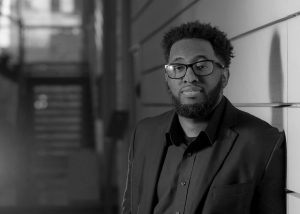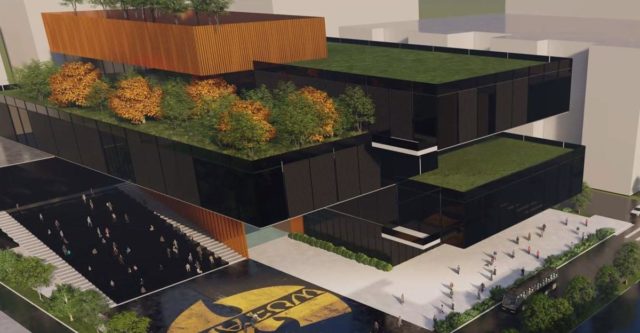When high schooler Elijah Edwards, 15, first heard about the Hip Hop Architecture camp — a place where students can learn about using rhythm, beats and lyrics to address issues in their community — from his mother, it was interesting enough to pique his creative mind.
“I had never thought of learning about architecture through hip hop,” he said in an interview. “That just kind of seemed like a disconnect at first.”
Still, the intriguing idea encouraged him to sign up for the free summer camp, where he spent a week learning about architecture and urban planning through the lens of hip hop culture with more than 600 other students nationwide. The camp — virtual, due to COVID-19 — dove into the basics of architecture, designing, art and more while pairing students with activists and artists to bring their ideas to life.
At the camp, Edwards designed a building based on messages from a fictitious hip-hop artist, as well as a business that addressed an issue in his neighborhood. He then created a rap to pitch his business. For Edwards, the camp brought an opportunity to further explore his love for hip hop using a new platform, which he continued to do after he found out that his experience would extend into a short-term internship.
Edwards and 14 other students from the summer camp were offered a chance to continue working on their designs through internships with architecture firms around the country. The offer came as a surprise, he said.
“I didn’t know about it so when they emailed me about the internship it was really surprising,” he said.
Still, he was excited to continue being part of the Hip Hop Architecture internship and working under the founder and CEO, Michael Ford.

Ford, known as the “Hip Hop Architect,” founded the camps in 2016 in Madison to introduce young people of color to urban planning. What started as a partnership program with Imagine Madison, a public listening campaign, grew into an international organization headed by Ford. Usually, the camps were held in person but the move to virtual in 2020 allowed the camp to hold a much larger program.
“We usually team up with universities and young professionals, pay them to go to a different city and teach our curriculum to about 40 kids in person,” Ford said. “COVID-19 changed that. We did our first online camp in August and had about 630 kids from all across the country. We were also joined by special guests like Angela Yee of The Breakfast Club, a designer of Beats by Dr. Dre headphones, and more.”
To celebrate their fifth year in 2021, the organization created the internship program Edwards participated in, where he took his initial business idea and created a real architectural rendering.
“I created a business called the hip hop youth center,” Edwards said. “It’s basically a program that’s youth based, but anyone can join it and it teaches people empowerment through hip hop, through the culture, not just rap necessarily. So we have all the different elements of hip hop, and not only are you learning the practical attributes of that, that specific art style, but also the business side of it.”
Edwards’ vision for his business came from his own musical inspirations, particularly the iconic hip hop group the Wu-Tang Clan, he said.
“I’ve started realizing that this is so much bigger than rap and I think that the Wu Tang clan kind of exemplified those attributes that I saw in my program,” he said.
From December 28 through January 2, 2021, Edwards and Ford worked together to create final renderings that were revealed at a showcase on January 16.
Though both were in the Madison area, the internship was entirely virtual. To make sure the experience was available to students who were participating, the organization partnered with local companies in Madison to offer laptops to students who needed them. Additionally, the software students used were free and web-based.
Overall, Edwards’ favorite part of the internship program was watching his and his peers’ designs come to life.
“Seeing my design taking form, it just looked amazing, it looks clean, it looks awesome,” he said. “And hearing about another students’ program and seeing it fleshed out, I liked it a lot. It was really great to see it all come together.”
For Ford, seeing the amount of interest from the firms have been a highlight from the camps and internship.
“I think when a lot of people hear the Hip Hop Architecture camp, some people might think it is gimmicky,” he said. “But here, [our] young people are talking about solving issues in their community, and [the firms] hear how good these young people can rap, it’s always priceless for me to see people’s faces. So that was one. And then the other thing that’s been great is seeing the amount of people per firm who’s actually working on a project. So, in initial conversations, we suggest maybe one or two people per firm who will convert a young person’s brand into something real. But after the kickoff, I think the firms went back and told their co-workers what they were doing and we’re getting screenshots of zoom calls where large teams are meeting for The largest one has been 18 people. So they’ve treated this like a real project that has come into their office and that’s been the other highlight, just seeing the excitement once people understood what the Hip Hop Architecture camp is and what the young people have created on their own.”
Ford hopes that excitement can continue with the showcase and beyond.
“My hope is to do a social media campaign, make all of the fictitious business partners, aware of the projects that the young people have created, which have been inspired by the lyrics and work that those individuals already do.”
Edwards is excited to show his friends and family the project he’s been working on.
“I’ve been telling people for so long and it’s one thing to hear about it but it’s another thing to truly experience and see all the hard work and all the creativity that was used to fuel the designs and whatnot,” he said. “So I’m just really excited to showcase it to everyone.”
And while Edwards is unsure of whether he will pursue architecture as a career, he believes it could be something he adds to his creative tool kit.
“I definitely really do like architecture and I think this is something I would like to continue to do in a more creative space,” he said. “It blends with a lot of my other hobbies and skills, which makes it more appealing to me. I like art and rapping so I will definitely be looking forward to continuing this long term.”




























